John Lee Dumas: From Corporate Job to Entrepreneur
Before John Lee Dumas launched Entrepreneurs on Fire, he was… miserable. John had what from the outside looked like a nice shiny job in corporate finance, but on the inside, the whole scene was driving him nuts. He felt trapped, and to break free, he jumped into the deep end and started a business whose sole purpose was helping other people start their business.
The first 13 months of this project were pretty underwhelming, as he’ll explain, but he kept at it, kept at it, and eventually… ka-ching.
John now makes six figures a month from Entrepreneurs on Fire, and he joined us to talk about that success, sure, but also the self-doubt that used to haunt him, the morning routine that does religiously to keep his inner game in check, and how he knew it was time to ditch his steady, stable life and launch something of his own.
You can find Start Yours wherever you listen to podcasts!
Start Yours is a podcast about ecommerce, dropshipping, and all things launching a business.
Join us as we meet entrepreneurs who have gone through the triumphs and headaches of running an online store, and learn how they managed to survive and thrive.
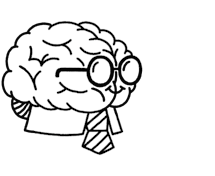
Don’t wait for someone else to do it. Hire yourself and start calling the shots.
Get Started FreeHow to Approach Entrepreneurship
David: So one of the things that’s interesting about your podcast and just your approach to entrepreneurship in general, is the emphasis that you put on taking care of your mind. And this might sound slightly counterintuitive to people who see entrepreneurship as purely about passive income and crushing goals and the digital nomad lifestyle. And you definitely hit on all that stuff, but you also talk about the importance of gratitude, for example, and you even have a second podcast called The Daily Refresh: Quotes, Gratitude, Breathing.
So I wanted to start by asking you about this relationship between taking care of your mind and your spirit, on the one hand, and the side hustle mentality on the other hand, why is something like guided breathing in the same ballpark as something like revenue goals?
John Lee Dumas: Well, first off, thanks for having me on the show. Much appreciated. Looking forward to dropping some value bombs for your listeners here today. And for me, it’s all about the inner game is a reflection of your outer game. If you don’t have your inner game on point, if you don’t have your inner game squared away, then your outer game is going to reflect that. Period, end of story.
For me, it all starts with my 90-minute morning routine. I am passionate about hitting five things every morning: hydration, exercise, sauna, journaling, meditation. I need to hit those five things. That’s going to allow me to give myself the self-care, the inner game, clarity, and relaxation, and focus. So that then when I shift from my 90-minute morning routine into my actual “workday”, I’m ready to go. And it shows.
People say, “John, I saw your Instagram story, the other day, you did 27 interviews on other shows in one day?” And I said, “Yes, I did,” ’cause guess what? I prepared myself for it. It’s like the Super Bowl. Do you think Tom Brady wakes up when it’s time for another Super Bowl ring and he just kind of like half-asses it? No, of course not. He absolutely has his pre-game rituals, his pre-game routines so he is mentally clear for what’s coming ahead. He knows it. I know what’s coming ahead.
So those 27 interviews for me, I’m prepped, I’m ready to rock. And guess what? The following day, I probably have nothing on my schedule because I’ve set it up that way because I need time to take a step back, to not talk, to relax, to be introverted. But on that day of 27 interviews, I am up for the challenge, each and every one, because of my inner game.
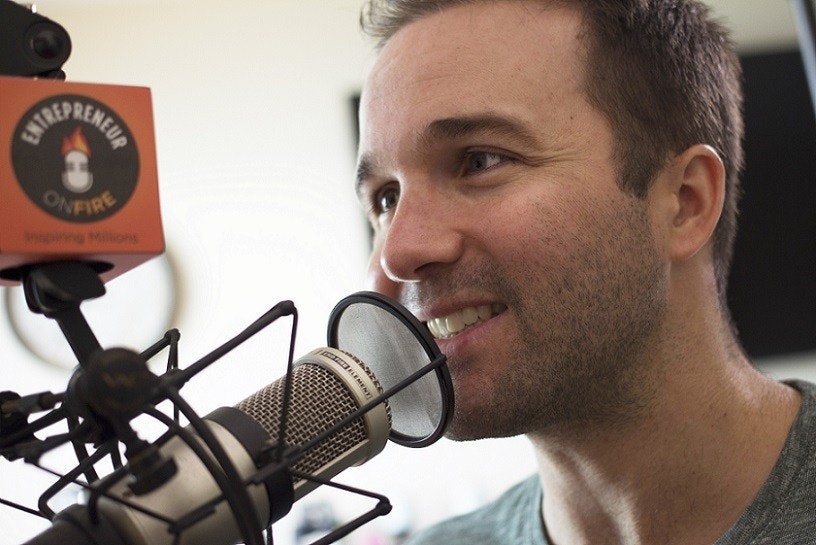
John Lee Dumas Outlook on Mindfulness
David: I can imagine that lots of people who wanna get into ecommerce, for example, they might think, “Okay, I need to spend 50 percent of my time researching products and 50 percent of my time studying Facebook ads,” and they might consider stuff like mindful breathing practices to be a luxury or something that might be a little bit of a waste of time. Do you think that there’s an appropriate amount of respect in the entrepreneurship space for breathing and calmness and this inner game that you’re talking about?
JLD: 100 percent. That kind of attitude that you were describing before are people setting themselves up for potential short-term success and long-term failure. The people that are gonna really win in the entrepreneurship game are looking for long-term success. They’re gonna be around one, three, five, seven, which is what I’ve been around for so long and still driving strong 10, 15, 30, 50 years. That needs to be the goal. And of course, you’re gonna evolve and change and do different things over that timeframe. But if you are going to have that well-rounded long-term success, it’s going to include that deep breathing, that meditation, that self-reflection, and that journaling. Those assets, they keep your inner game strong.
David: What do you journal about?
JLD: Whatever is on my mind and that’s why I love journaling. Literally, as entrepreneurs, there are usually so many thoughts journaling… Sorry, swirling in my mind and journaling allows me to take those swirling thoughts, put them down on paper, and just get them out of my head. Do you know what I mean? It’s just like I have a lot of voices in my head and I’m not crazy. It’s just being an entrepreneur, it’s being a businessman, and I’m always having thoughts and ideas, and I need to get those things down. So once I get them down on paper then my brain can be like, “Ah, okay, that thought is saved somewhere. I don’t need to save it anymore myself.” And that offloading allows me to clear that space for new ideas, for new concepts, for new creativity, or for whatever challenge or task I have set forth for my next hour, two hours, day.
On Taking Risks
David: So you mentioned being in this for seven or so years. Let me circle back to your own personal stories, and I think, in a lot of ways, you were living, what a lot of people would consider to be a pretty good life. You had a secure job, secure income, and lots of that surface-level stuff was in place, and basically really stable.
But it sounds like you still kinda couldn’t imagine doing what you were doing for the next 10 or 20 or whatever years and you’ve talked about how you were basically doing exactly what you were supposed to have done, but you were still kinda miserable. So I’m curious about how your expectations for that stable, smooth life, how those expectations differed from the reality that you saw once you were in the middle of it.
JLD: The reality is this, is that I was doing what I thought I was supposed to do. I was checking the blocks, I went to high school, to college, I was an officer in the US Army for eight years, went to law school, was in corporate finance. I was doing the things that I wanted to do, but there was still this void inside of me that was just like, “Why are you spending your days doing X, Y, or Z, making somebody else rich, making some other company more money, making these mindless phone calls, attending these pointless meetings, commuting in these, just, soul grinding traffic jams? Why are you spending your time doing this?”
Because as an officer in the army frankly, I saw death up close during my 13-month tour of duty in Iraq. I saw people’s lives snatched away when they were 18, 22, 27 years old, and that’s sad to know that they’re never going to experience another day in their lives and I’m like, “Who am I to not be happy, still having this gift of life in front of me, having not made the ultimate sacrifice that some of my fellow soldiers made?” And to me, it was just like, “Enough is enough.” It’s like I owe it to them to live the life that I’m most capable of and to take the risks, to have the courage to put myself out there, and yes, maybe fail multiple times but guess what? Maybe actually succeed too.

And I did fail plenty of times and I continue to fail all the time. But I have the confidence and the courage to get back off the map, try something else and keep moving forward. And we turn Entrepreneurs on Fire, with that attitude, with that mentality of being willing to fail, into a multi-million dollar a year business by year two that we’ve maintained now for the past six years.
And something that I’m very passionate about is, how can I impact a lot of people while generating a lot of revenue that then allows me to impact even more people? It’s like this circle of life that needs to happen if you’re gonna keep growing your business, growing your impact, growing your influence. But for me, it all goes back to that, “Do I have the courage to take that first step, to take that first leap?” And most people, they never do, and it’s their biggest regret late in life.
The Magic of Entrepreneurship
David: And you talked about risk and about having courage. Were you pretty freaked? Just kinda turning your back on this stability that you’d kind of cultivated for yourself?
JLD: 100 percent. But it’s key to remember the phrase, “All the magic happens outside of your comfort zone.” I’ve read that in books. I saw it on quote boards. I had never lived it, so I didn’t know if I quite believed it when I first started. But once I did it once and got outside of my comfort zone and actually tasted that magic, saw the magic, and felt the magic, I was like, “Wow. This is real.” And I just have kept doing it ever since.
I keep pushing myself outside of the comfort zone, so I can taste that magic, smell it, see it, live it, be it. Because all the magic happens outside of your comfort zone. So many people that just live in that cozy little place where it’s their cubicle, they know how to just do those TPS reports day in and day out and you know, they’re living in their own little bubble. That’s not my world, I don’t wanna be in that comfort zone, I wanna try new things, I wanna scare myself. I want to push the limits to create that magic.
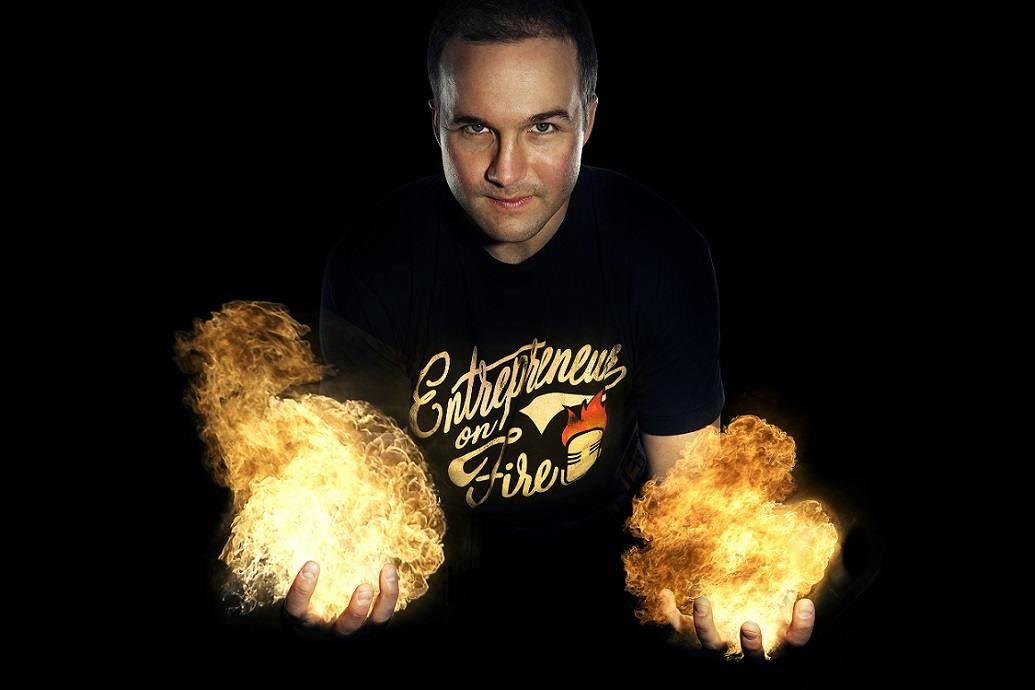
David: Now, when you’ve talked about this pre-entrepreneurship life, you’ve used the word “trapped” before and I wanted to press you on this word “trapped” because it’s a heavy, miserable word. What do you mean when you talk about feeling trapped in this kind of previous life?
JLD: Man, trapped was just like, I thought that I’d done all the right things, and I thought that I was supposed to be handed this perfect life. I thought that I deserved it. Well, now I realize looking back, that we don’t deserve anything. We deserve what we create. This entitlement has to go away. What world are you gonna live in? And so many people are trapped on such a higher level than I felt trapped. ‘Cause I felt trapped because I was like, “Well, I’ve gotta stay in this path of corporate finance, of going to law school, this traditional path.” I thought that was my only way to go. I didn’t see any exit, I didn’t see any way out at the time. It wasn’t until I started reading books and listening to other podcasts that I was able to find my path outside of that maze that did feel trapping.
But the reality is, unfortunately, for other people, they’re trapped with all of that stuff that I just talked about, that I was trapped by, and additionally, they’re trapped by debt. Because they took out way too much in student loans, because they are paying way too much rent for their apartment, because they’re paying way too much on their car and their mortgage payment and with X and Y and Z and they’ve trapped themselves in debt, where they are living paycheck to paycheck, where just one, two, or three missed paychecks is a disaster for them.
And that’s being trapped and that’s sad and that’s something that I really want people to start to open their eyes up that, man, you need to avoid that trap and if you are already in that trap, man you need to find a way A, to start wheedling down that debt or B, you gotta pass along that knowledge to your kids, where they cannot spend $80,000 a year, going to an out-of-state college when they can just as easily be spending two or five or six thousand dollars a year at in-state, getting essentially the same piece of paper in their hand at the end of the four years and not the crippling debt that goes along with this.
That’s a whole other, obviously, rabbit hole that we’re not gonna go down today. But I mean, that’s what some people need to open their eyes up about is they’re being trapped before they even open their eyes to the opportunities that exist in this world.
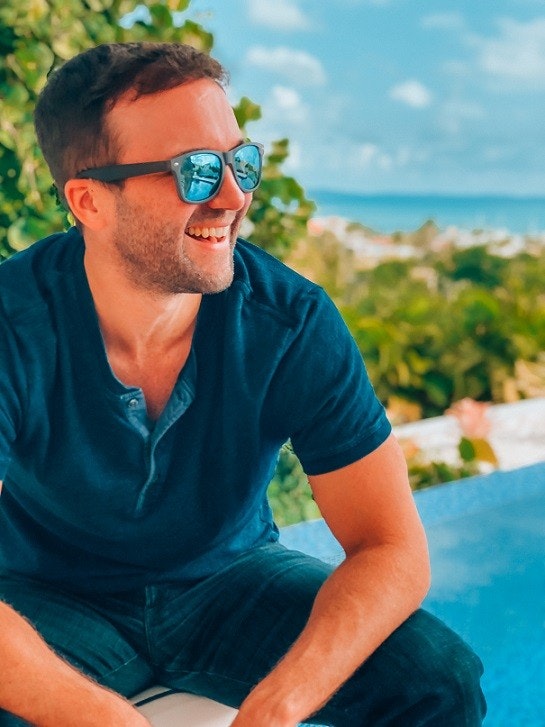
Entrepreneurs on Fire
David: At this point, Entrepreneurs on Fire, it’s seven years old, as you mentioned, you’re thousands of episodes deep, you got thousands of five-star ratings on iTunes, you’ve had an insane roster of guests, Gary Vaynerchuk, Tim Ferriss and so on. But it wasn’t always like that. And you talked about failure earlier, and how you had some, maybe some face plants out of the gate. I’m curious about any, “Holy crap, what am I doing?” moments that you had in the early years. Was there any of that going on?
JLD: All of it. I’m telling you, every part of my success came outside of my comfort zone, so every time I had success, every time that I took the next step in my business or life it was because I was outside of my comfort zone, feeling freaked out, falling on my face, embarrassing myself, doing all these things. But in reality, just making myself better, putting in the reps, doing what has to be done, doing what all those people that you mentioned have done. They’ve all been terrified, fallen flat on their face, embarrassed themselves. Of course they do. And they continue to do so that’s why they stay on top, that’s why they’re still making it happen in their industry, in their niche, in their little curve that they’ve cut out in this world.
So for me, that’s what it’s all about. And that still happens to this day. I just hosted a 45-day Masterminds… Sorry, a 45-person Mastermind, it was three days, down here in Puerto Rico, and it was scary. I mean having 45 people coming down to my house in Puerto Rico to learn from me and they spent a pretty penny to be selected for this opportunity. I had to deliver. And this is 2020, and I’ve been rocking it for years and years and years now, but I still put myself in those situations. Like right now I’m planning my first ever actual event where we want 400, 600, maybe 1,000 people eventually at this event that we’re gonna throw and it’s just exciting to see where we can go in this world when we keep putting ourselves outside of that comfort zone.
David: You mentioned reps, it’s an interesting way to talk about it, and I think some people, they’re maybe a little bit, maybe scared to make mistakes or they’re gun-shy. Is just doing it and doing it and doing it over and over and over again, is that something that is… You said it’s valuable for you, is that something that you’ve seen as well in other people, that, just being prolific, even if there’s a prolific failure at the beginning that that’s gonna be huge down the road?
JLD: “John, how did you become a good podcast host?” I get that question all the time. And guess what? I put in the reps. I kept doing the work. I did a podcast episode every single day for 2,000 days in a row. If I didn’t get good, there’s something wrong with me. You need to think about that my friends. You need to put in the reps. Nobody that you admire who’s good at something right now, nobody became good at it without putting in the reps. You’re not born naturally gifted at X, Y, Z, and D. We don’t know any of this stuff. We become good at it because we put in the reps.
The tragedy that just happened with Kobe Bryant very recently, guess what? He’s known as one of the hardest working individuals ever in basketball. And that’s why he achieved the success that he achieved because he put in the reps. Every single day, he was at practice first, at practice last, putting in the reps and he became one of the all-time greats, and it’s just unbelievable and people just could look at him and say, “Oh, man, I just wish I was as lucky as Kobe was with those genes.”
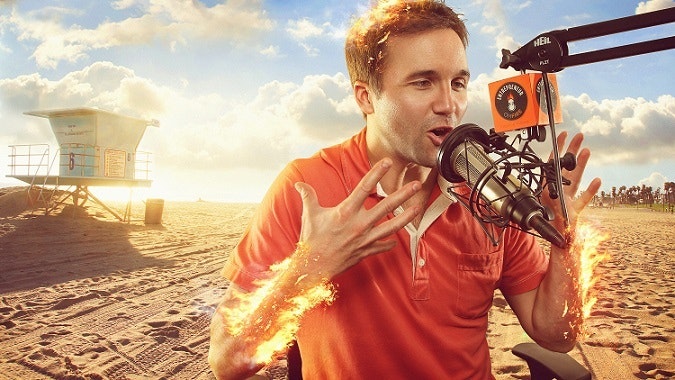
Yeah, guess what? He definitely has some gene help with being 6’6 and being agile and fast, and all those things, like that helps. 100 percent. No doubt, I’m 5’10. I could be as athletic as Kobe and still not the stud that he is, ’cause he’s got eight inches on me. But guess what? That guy put in thousands and thousands and thousands of hours of reps. That’s why he was a winner.
David: What was the plan with the podcast out of the gate? ‘Cause like you said, you weren’t a natural-born podcaster, perhaps it’s not something that anybody is born being able to do. So you had to build it, you had to do it and do it and do it. What was mapped out at the beginning, with regard to the podcast and whether or not this would be the centerpiece of this huge operation that you have now?
JLD: Honestly, the one roadmap that I had was an Albert Einstein quote, “Try not to become a person of success, but rather a person of value.” That was the focus. For 32 years, I was trying to become a person of success and it wasn’t working. I was doing what I thought was all the right things: an officer in the army, law school, corporate finance. No success was coming to me. But then I saw that quote, I’m like, “Let me flip it on its head. Let me try to become a person of value, by delivering a free, valuable, consistent daily podcast called Entrepreneurs on Fire.” And for 13 months, I made almost no money doing that, every single day, but then at month 13, it clicked.
The value added up, the tipping point happens, and from that month on, I’ve been generating over six figures of net profits for 76 months in a row with the business Entrepreneurs on Fire, which as you mentioned earlier, we published in our monthly income reports at eofire.com/income. We love showing people how we’re making money, how we’re losing money, mistakes we’re making, successes we’re having. We wanna lay it all out, so people can avoid our mistakes and emulate our successes. That’s what they’re all about. And listen, I just was focused on becoming a person of value. That’s what the concept was. That’s what the goal was, at first, and then all the success came as a result.
John Lee Dumas on the Work It Takes to be Succesful
David: So you’re all about productivity and discipline and focus. This seems like this is kind of your Holy Trinity to your approach to life, and I’m curious to what extent productivity, discipline, and focus come naturally to you, and then how much you feel like you’ve had to train in them? Because I can imagine somebody, they might have crap focus or they were diagnosed with ADD or whatever, they might think that they’re doomed, that they’re not gonna be able to do this. To what extent are these things learned and if they are learnable, what are the ways that people should go about doing them?
JLD: Listen, the reality is this: You need to focus on becoming a productive, disciplined, and focused individual. I’m not saying that’s super simple to do, it’s not gonna come overnight. That’s actually why I created one of my best works of all time, it’s called The Mastery Journal: How to Become Productive, Disciplined and Focused in 100 Days, because I know it’s not easy, and it didn’t take a short amount of time for me. It took a long period of time for me to master those three things.
But what is being productive? It’s producing the right content. What’s being disciplined? It’s being a disciple to a plan of action and actually executing that action. And then what’s being focused? Following one course until success. Not two, not five, not 10, which most people are doing. Focus, follow one course until success. I get that ADD is so easy these days, with Instagram beeping every second and your phone ringing and Facebook blaring and somebody screaming your name, I get it. You’ve got to focus. You gotta follow one course until success. If you do, you will win. If you don’t, you won’t win.
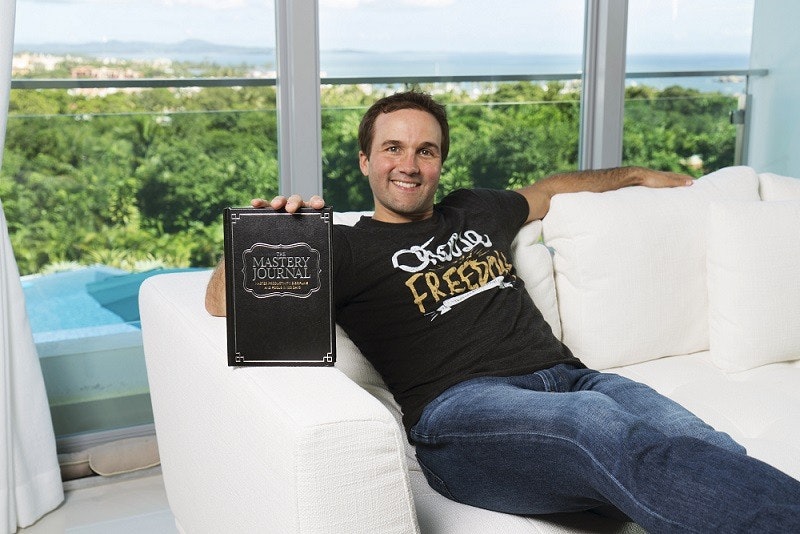
David: You’ve kind of mocked the idea of being too busy. And maybe mock is too strong of a word but…
JLD: No, it’s a good word. It’s a good word.
David: Okay, okay. You’ve at least rolled your eyes at the idea of being too busy. If people say, “Oh, I don’t have time to read books or I don’t have time to exercise or eat right,” whatever the thing is that they don’t have time for. What do you think or what do you tell people when you hear about them being too busy?
JLD: I say we all make choices. Why am I, a human being, able to have the time for 90 minutes in the morning to do my morning routine, able to eat right, able to exercise right, able to hydrate right, able to focus on meaningful work that’s making impact and influence in this world? Because I’m focused. Because I’m doing the right things. You’re a human being… And I’m not talking specifically to you, I’m talking to the listener right now. I’m saying you’re a human being as well and so you’ve made choices. If you’re one of those people that are saying, “I’m too busy,” you’ve made choices that have led to that reality.
I’ve made choices that have led to my reality. Guess what? The first 32 years of my life, I was that other reality where I was too busy to do anything. But guess what? At 32 years old, I educated myself to the level of realizing that I’m a result. My actions and decisions are a result of my reality, and I made different decisions. I’m a result of the changes I made in my life. I made the decision to become more focused, to become more productive, to become more disciplined, and I’ve created a life that I wanted. Everybody listening can create the life that they want when they commit to doing the things they want. Everybody listening to this is saying, “Oh, I can’t wait until this interview is over ’cause I’m gonna go Netflix and chill.”
Well, guess what? There’s a reason why that’s gonna become your life, Netflix and chilling. And you know what, for some people, honestly, that’s fine. But I doubt it’s fine for the people that are listening to a show like this. You don’t listen to this kind of content if you just wanna Netflix and chill for the rest of your life. There’s the vast majority of individuals in this world who will do that and that’s fine. That’s fine. But for those people who want more, who want financial freedom, who want location freedom, who want lifestyle freedom, it takes more. It takes decisions. And guess what? I didn’t get here overnight, but I got here because of the decisions that I made.
The Freedom Journal
David: Alright, you just used the word freedom three times, so I gotta pounce on that. And this is a word that you use a lot, you even have The Freedom Journal, which is something that’s available on your website. And freedom is something that you romanticize and you’re in love with this idea. What is freedom in the context that you talk about it? In the context of entrepreneurship?

JLD: Freedom is living life on my terms. That’s the simplest way I can put it. I took a 90-day trip to Europe with my girlfriend, Kate, because I had the freedom to do that. Kate just took off today, a Wednesday, or it’s a Thursday to go to San Juan to meet her aunt and uncle who are getting off a cruise ship and spending a couple of hours here because she has the freedom to do that, because of the lifestyle that we’ve created.
It’s living life on your own terms. I wanted to move to Puerto Rico. We moved to Puerto Rico. I wanted to take a 90-day trek over the fall, last year. We did it. I wanna take a 23-day river cruise in Europe this coming May. We’re doing that. It’s living life on my own terms. My calendar, my schedule, is chock-full of things that I said yes too. Not that somebody said, “You have to do this, you have to do that.” This is my business, my life, my decisions. And guess what? Again, I’m not saying that I sat on my fingers and got here overnight. There was year one, year two, year three, year four. A lot of hard work to create the business and the lifestyle, and the systems, and the automation, and the team to get to where I am now at year seven, year eight of my business. But I got here and you can too. It’s a matter of making those decisions.
David: So let’s say, somebody… They want the freedom, that it all sounds good, that they’re not digging what they’re doing now, but they know they’re not gonna get into podcasts. That’s not gonna be their ticket. But they do have this itch that we’ve kind of been talking about. What sort of thought process should they be embarking on when they ask themselves, “Okay, what I’m doing now isn’t good for me, but what is my thing? What should I be doing?”
JLD: Listen, I’ve heard this question from literally tens of thousands of people because it’s an understandable question. I was asking that question to myself at 30, at 31, at 32 before I finally came across my big idea, which was Entrepreneurs on Fire. Your big idea should rightfully so be something completely different or completely unique to you because it’s your big idea and that’s where the beauty lies.
And listen, this isn’t like a shameless plug, because this is a completely free course, but I created this for you people that are having this very same question. It’s called Your Big Idea. So if you visit YourBigIdea.io, you can, for free, take this 60-minute video course that I created to get to your big idea and then you’ll identify that big idea, and you’ll be off to the races, ’cause I understand that it’s a struggle. That’s why I created these structures, these tutorials, and these exercises to make it clear what your big idea could be. And this free course has helped unveil so many opportunities for so many people because they just sat down and actually took the time to go through this process and understand what their big idea is and then go all in.
Being a Digital Nomad
David: So I gotta ask you about the travels that you’ve mentioned. You said you relocated to Puerto Rico, you did the big Europe trip where you were kind of living the digital nomad life. So whether it’s digital nomad, or location independence, whatever you wanna call it, this idea that you can kind of just pick up and go, I think that’s something that inspires a lot of people. That’s a big part of their itch. What’s it like to have this situation where the whole world’s your office or anywhere with a WiFi connection’s your office?
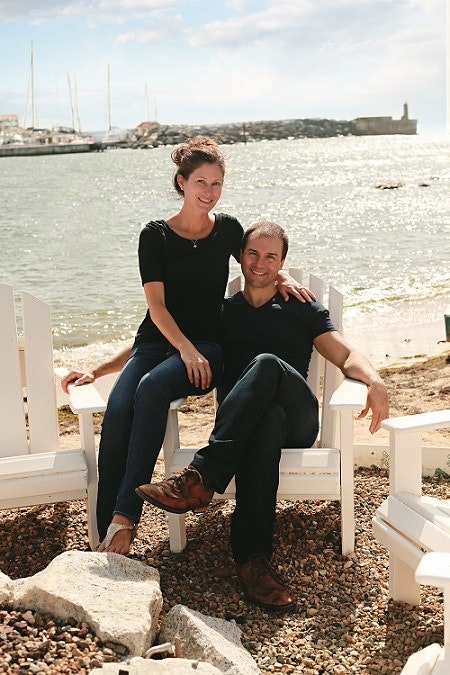
JLD: It’s the dream. It’s living life on my own terms. That’s the definition of freedom that I wanted to create, was living life on my own terms. And I love the fact that I can be in Annecy, France, which we were this past fall. And go out and spend an amazing day in this beautiful French village, and have lunch and dinner, and go bike riding around the lake, and do all these things. And then come back, put 45 minutes of work in on email, on social media and be done for the day, and knowing that my business is running, and generating revenue, and doing its thing.
And again, I’m not painting this picture of this dream that that life happened to me overnight. That’s seven years into launching my business, but it is a reality for us today, and it’s something that we take full advantage of, because we live in a world where if you want to create an online business, you then have an opportunity that wherever you can get on WiFi, you can be running that business. And it’s a magical, beautiful thing.
David: How has entrepreneurship changed since you got into the game? Seven years isn’t that long, but it’s long enough to where things might have evolved a little bit. Are there any huge differences between now and when you got started?
JLD: The biggest difference from when I launched Entrepreneurs on Fire back in 2012 to today, 2020 and beyond, is you have to niche your face off. Meaning you can’t just have this vague, broad, big idea that you just wanna serve the world doing X, Y, or Z. It’s you have to niche down and create a very specific solution to a very specific problem. That’s how you’re gonna win, that’s how you’re gonna create initial momentum, because it is so hard to get initial momentum in this world when it comes to entrepreneurship, when it comes to business, when it comes to life. Period.
But you’re making it so much easier on yourself when you niche down and you’re serving one specific target audience the best possible solution to their real-life struggle.
David: Awesome. John Lee, we can leave it there and anybody who hasn’t checked out Entrepreneurs on Fire, give it a listen. It’s fun, it’s positive, you’ll leave it feeling good. It’s a kick-ass podcast. So John Lee, thanks so much for taking the time to chat, I appreciate it.
JLD: David, it’s been straight fire. Thanks for having me, my man. Appreciate it and prepare to ignite.